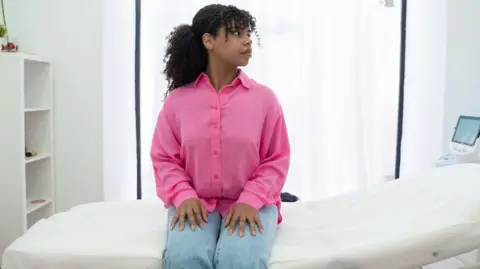Cervical screening invites to change in England
 Getty Images
Getty ImagesInvitations for cervical screening will be sent out every five years instead of every three for women aged 25-49 in England, if they have a negative test.
Research shows they are at very low risk of cervical cancer and can safely wait longer to be screened again, NHS England has said.
The roll out of a vaccine to protect against HPV - the virus which causes nearly all cervical cancers - has reduced cases by around a quarter since the early 1990s.
Charities said the change was good news for those at low risk because they no longer needed to go for screening as often.
Scotland and Wales have already introduced this change, which will start in England from 1 July.
Cancer Research UK urged women and people with a cervix not to wait for a screening invitation if they noticed any unusual changes.
They are encouraged to go for regular cervical screening between the ages of 25 and 64.
Currently, those aged 50-64 are invited every five years and 25-49 year olds every three years.
NHS England says it now wants to spare younger women appointments they don't need as part of "a more personalised approach".
Cervical screening involves testing for HPV, human papillomavirus. Some types of HPV can cause cell changes in the cervix, which may develop into cancer over time. Nearly all cases of cervical cancer are linked to high-risk HPV.
If that HPV test is negative, studies suggest the chances of someone developing cervical cancer over the next 10 years is very low.
This is more accurate than looking for cancer cells on their own.
A recent study showed that screening every five years is as safe as doing it every three years, because the same number of cancers are found and fewer screening tests are needed.
Anyone eligible will receive a notification via the NHS app to book a screening appointment, NHS England said.
"The NHS is following robust evidence on how often women need to be safely screened, and by putting invitations and reminders straight in women's pockets on their phones, we're making it easier than ever to take up screening appointments," said Dr Sue Mann, national director for women's health at NHS England.
It previously said it was possible to eliminate cervical cancer by 2040, thanks to improved rates of vaccination and screening.
Cervical cancer is the fourth most common cause of cancer in women worldwide.
Cervical cancer symptoms
The main symptoms are:
- vaginal bleeding that's unusual for you – including during or after sex, between periods or after the menopause - or heavier periods than usual
- changes to vaginal discharge
- pain during sex or in the lower back, lower tummy or between the hip bones (pelvis)
Source: nhs.uk
